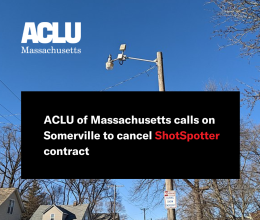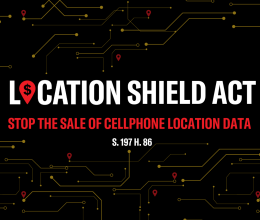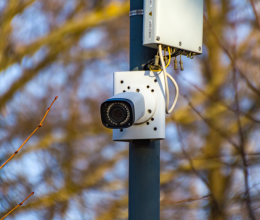
Massachusetts’ police reform law takes effect today, including limited regulations on police use of face recognition technology. The new reforms only address police use of face recognition to search images and identify a person in a database. The ACLU of Massachusetts backs legislation to ensure this surveillance technology is never used by law enforcement to track or monitor people in Massachusetts schools, parks, and other public places.
Kade Crockford, Technology for Liberty program director at the ACLU of Massachusetts, today released the following statement in response:
“Our movement to stop face recognition has been successful so far because policymakers and residents alike understand this technology is dangerous when it works, and when it doesn’t. But we have more to do to guarantee our basic freedoms thrive in the 21st century: The new reforms fall well short of protecting people from the most dangerous form of face surveillance—its use to automatically catalogue and monitor the movements of ordinary people as we go about our business in public spaces. This technology gives the government unprecedented power to track who we are, where we go, what we do, and who we know. Massachusetts must do more to protect all people from invasive, biased face surveillance technology, and we look forward to continued collaboration with the legislature and the people of Massachusetts to get it done.”
Background:
In 2020, the Massachusetts legislature advanced historic regulations for police use of face recognition technology. Unfortunately, Governor Baker struck those provisions entirely with a misguided amendment. Ultimately, the governor signed much weaker language, which became Section 220 of Chapter 6 of the General Laws. Current law does not sufficiently protect racial justice, privacy, due process, or civil liberties.
The ACLU backs a new proposal, introduced by Senator Cynthia Creem and Representatives Dave Rogers and Orlando Ramos, that would further protect millions of people from this intrusive, racially-biased technology. The new bill, modeled after the approach enacted by the House and Senate last session and rejected by Governor Baker, would prohibit government agencies from using face surveillance to track or monitor people in places like schools, libraries, parks, and municipal buildings; require police to obtain a warrant before conducting a face recognition search, except in emergency situations; and establish due process protections for criminal defendants subjected to face recognition searches.
The ACLU is leading a nationwide movement to defend privacy rights and civil liberties against the threat of unregulated face recognition surveillance. As part of ACLU-led campaigns, multiple jurisdictions have prohibited police use of face recognition technology, including San Francisco, Berkeley, and Oakland, California; Boston, Brookline, Cambridge, Easthampton, Northampton, Springfield, and Somerville, Massachusetts; New Orleans, Louisiana; Jackson, Mississippi; Portland, Maine; Minneapolis, Minnesota; Portland, Oregon; King County, Washington; and the states of Virginia, Vermont, and Maine. New York state also suspended use of face recognition in schools and California suspended its use with police-worn body cameras.
For more information about “Press Pause on Face Surveillance,” go to: http://www.aclum.org/presspause






